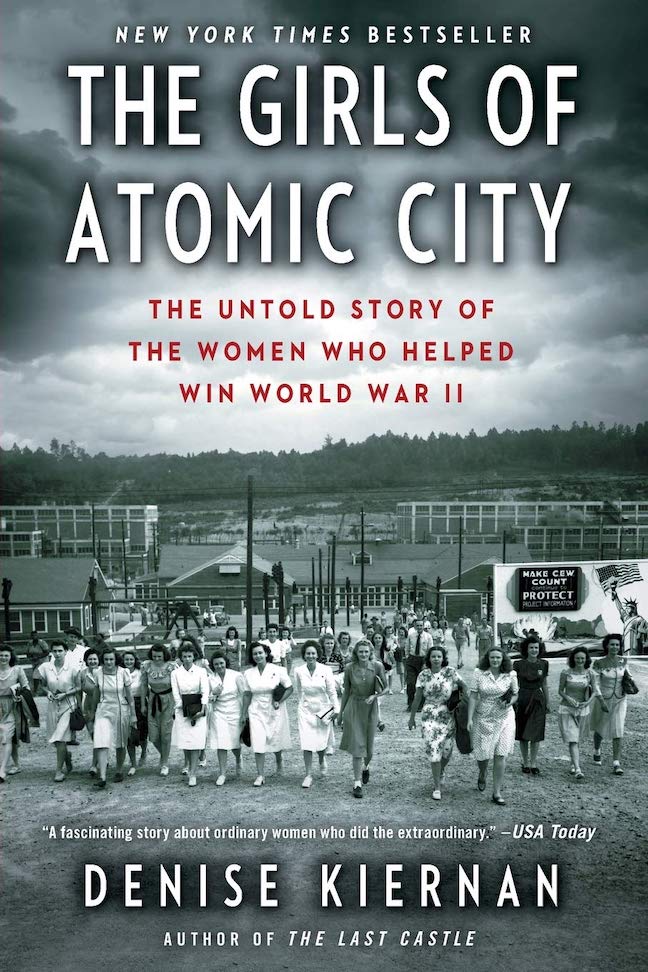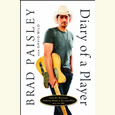The Worthless Servant
Novelist Ann Patchett takes a ride with Charlie Strobel, Nashville advocate for the homeless
FROM THE CHAPTER 16 ARCHIVE: This essay originally appeared on March 27, 2013.
***
In the middle of June in Nashville, a few days before the summer became unendurably hot, I was in the car with Charlie Strobel, driving out towards the river. To grow up Catholic in Nashville is to know at least some of the members of the Strobel family, and long before Charlie and I became friends, I knew the stories of what he had accomplished, and what he had lost. We were on our way to the Stadium Inn to visit some homeless men who were about to get their own apartment, and while he drove, Charlie told me a story about Father Dan Richardson. Father Dan was the priest at Assumption, the North Nashville parish in the poor neighborhood where Charlie grew up. It was not too far from where we were headed now.
“Father Dan was a father figure to me,” Charlie said, his own father having died when he was four. “We lived down the street from the church, and by the time I was in the third or fourth grade, I was an acolyte.”
Assumption was a parish with an older congregation, and Charlie remembered the funerals coming one after the other. For every funeral, Father Dan gave the exact same homily. “We knew it word for word. We could mouth it along behind him,” Charlie said, and though he is sixty-nine now, a good distance from his altar boy self, he begins the recitation:
“Father Dan would say, ‘We’re on this earth to get ready to die. And when we die, God’s not going to say, ‘Charlie [Ann, Sally, John, fill-in-the-blank], what did you do for a living? How much money did you make? How many houses did you have?”’ God is only going to ask us two questions: ‘Did you love me?’ and, ‘Did you love your neighbor?’ And we can imagine that Charlie [Ann, Sally, John, fill-in-the-blank] will answer truthfully, saying, ‘Yes, Lord, You know I loved you. You know I loved my neighbor.’ And then God will say, ‘Well done, good and faithful servant. Now enter into the kingdom of heaven.’”
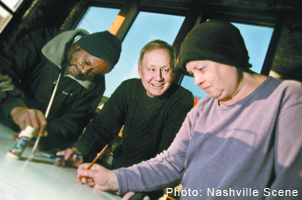 Charlie smiled at the thought of it. “He nailed it every single time. He had this soft voice, and his cadence was perfect. Even though I knew exactly what was coming, it never failed to grab me. It was sad, especially if I knew the person who had died, but I never heard it as anything but a positive and hopeful message. We come from God, we return to God, so death was never frightening.”
Charlie smiled at the thought of it. “He nailed it every single time. He had this soft voice, and his cadence was perfect. Even though I knew exactly what was coming, it never failed to grab me. It was sad, especially if I knew the person who had died, but I never heard it as anything but a positive and hopeful message. We come from God, we return to God, so death was never frightening.”
Charlie realized then that he had missed his exit. Neither one of us had been paying attention to the interstate, and neither of us was sorry. It gave him time to finish the story.
“Even after I grew up and became a priest, I could never call him Dan. It was always Father Dan. I’d always say to him, ‘What are you going to get me for Christmas this year?’ And he’d say, ‘A bridge,’ because the homeless lived under bridges.” Father Dan, who was Irish, was always one for a joke.
“When I went to see him for the last time before he died, we had a personal talk, a father-son talk, and I told him how much I loved him. Then I said, ‘Now I’m going to be your priest,’ and I did his whole routine—‘We are on this earth to get ready to die, and when we die, God’s not going to ask, “Dan, how much money did you make?” He’s going to ask two questions: “Did you love me?” and, “Did you love your neighbor?” And I know you’ll say, “Yes, Lord, You know I loved you. You know I loved my neighbor.” And God will say, “Enter, good and faithful servant.” ’
I was struck by how often the lessons we learn when we’re young, the things we could never imagine needing, make it possible to meet what life will ask of us later. “I’ve grown to be who I am,” Charlie said, “because of those life experiences each of us has.”
Charlie greeted every man and woman who leaned by the door or sprawled in the lobby. He announced our plans to visit Ron and Sid to the woman at the front desk, who claimed to have no idea who they were. Then he told her he was Charlie Strobel and that he was expected. “Oh,” she said, smiling and nodding.
In its finest hour, the Stadium Inn must have been a cheap motel where fans of the opposing teams could spend the night after a football game. But any football fan who booked a room there now would be able to realize the error of his ways without ever getting out of the car. When we pulled up to the front, Charlie stopped and looked at the men sitting on the steps, then he looked at me. “I’ll leave the car running,” he said, trying to calculate how long he might be inside. “You lock the doors and wait.”
When I told him I was happy to go with him, he gave me an enormous smile. “Oh, that’s wonderful,” he said. He reached in the backseat and pulled out a two-burner hot plate. The Stadium Inn was what my policeman father would call a flop house, a pay-by-the-week motel of the lowest possible order. Charlie greeted every man and woman who leaned by the door or sprawled in the lobby. He announced our plans to visit Ron and Sid to the woman at the front desk, who claimed to have no idea who they were. Then he told her he was Charlie Strobel and that he was expected. “Oh,” she said, smiling and nodding. She gave us the room number and directed us to the elevator. Ron and Sid would soon be moving into their own apartment, an apartment which had no stove. They would need a hotplate. We took the one we had upstairs.
Every human catastrophe the carpet in the hallway had endured over the years had been solved with a splash of bleach, which rendered it a long, abstract painting. Beneath the low yellow light, the row of closed doors each thumped out a distinct musical beat, including the door we were standing in front of. I saw an eye study us at the peep hole and then pull away. I stepped to the side, certain that I must look like a parole officer. “Sid,” Charlie called out in the tone of a cheerful and persistent relative who had dropped in for a visit. “It’s Charlie. Open up the door.” He waited, and then he knocked again.
It was a long wait, but finally the door cracked open and a single dark eye peered out of a cloud of cigarette smoke, then the door opened wider. “Father!” the man said, and gave Charlie a hug. (Charlie can do without the title, as he thinks it creates a distance between people. Still, if the word Father makes anyone feel better, he accepts it.)
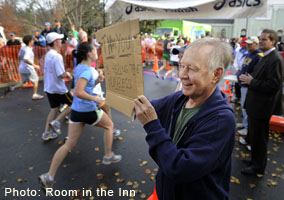 Sid and Ron are salt and pepper shakers, Sid with dark brown hair and a heavy brown beard, Ron with faded red hair and a greying beard going halfway down his chest. Both men wore loose jeans, tank tops, baseball caps. Neither could have weighed more than a hundred pounds, their upper arms no bigger than their wrists. Introductions were made and they shook my hand. For all their reticence about opening the door, they were clearly pleased we had come. There were two unmade beds in the room with a heaping ashtray between them, a console television playing the country music station. A shopping cart was parked against the wall, neatly packed, its contents tarped over and tied. “We’re ready to go,” Ron said, giving the cart a pat. “We’ve got somebody coming tomorrow to help us move.”
Sid and Ron are salt and pepper shakers, Sid with dark brown hair and a heavy brown beard, Ron with faded red hair and a greying beard going halfway down his chest. Both men wore loose jeans, tank tops, baseball caps. Neither could have weighed more than a hundred pounds, their upper arms no bigger than their wrists. Introductions were made and they shook my hand. For all their reticence about opening the door, they were clearly pleased we had come. There were two unmade beds in the room with a heaping ashtray between them, a console television playing the country music station. A shopping cart was parked against the wall, neatly packed, its contents tarped over and tied. “We’re ready to go,” Ron said, giving the cart a pat. “We’ve got somebody coming tomorrow to help us move.”
“Are you staying sober?” Charlie asked, his voice making it clear that he will be proud of them if they are, and love them still if they are not.
“We are, Father,” Sid said.
“Four days, Father,” Ron said.
Charlie tried to lead them in a conversation about how much better it was to be clean, and though they clearly wished to please him, their hearts weren’t in it. They planned to find jobs once they settled, maybe dishwashing. Ron took off his baseball cap and pushed back his hair to reveal a long scar running across his forehead. “I don’t know though,” he said. “I don’t think so clear since I got hit.”
“Are you staying sober?” Charlie asked, his voice making it clear that he will be proud of them if they are, and love them still if they are not.
Charlie gave them the hot plate and they marveled at the newness of the thing, still in the box. They talked about the move, and Charlie promised to get them bus passes. When we were finally ready to leave, both men hugged him again and promised good behavior for the future. They told us about a man five doors down the hall, someone who wasn’t doing as well at staying out of trouble, and so we went and knocked on that door for a long time, but despite the music blaring from the other side, no amount calling could draw anyone out.
“That’s the best I’ve seen them look in a long time,” Charlie said cheerfully as the shuddering elevator dropped to the first floor. “Their eyes looked good, didn’t you think?”
I hadn’t seen their eyes before, but I was struck by the sweetness of both men, and how more than anything they looked tired. Homelessness is an exhausting and dangerous state of being.
Charlie has a good story that he likes to bring out for fundraisers—that his career with the homeless can all be traced back to a single peanut butter and jelly sandwich he made for a man who knocked on the rectory door when he was a young priest at Holy Name. The next step came soon after that, as he explained in a lecture he gave at the local Unitarian Church:
“He was my terrorist. He kicked in the screen door. He cussed out everyone in the parish. He expected everything to be done for him. My mother used to say to me, ‘Doy is your ticket to heaven.’ And I’d tell her, if he’s my ticket to heaven I don’t want to go. Everyone in the parish was afraid of him.”
They were in the church parking lot, sleeping under my window, and the temperature that evening was dropping below freezing. I didn’t think too long about it, probably because I knew I would talk myself out of it. As a pastor, I knew the consequences of such a decision were far greater than simply giving a dozen men one night’s lodging. What do you do tomorrow night when they return? And the next night and the next night and on and on? One simple decision could be parlayed into a lifetime commitment. What would the parishioners say? Or the bishop? Or the neighbors? For the moment, I decided that it was the thing to do. Like Scarlet O’Hara, I found myself saying, “I’ll worry about that tomorrow.” So I invited them to spend the night, and they’ve been with me ever since.
It was while he was trying to meet those immediate needs that Doy Abbott arrived.
“He was my terrorist,” Charlie said. “Every morning he woke me up to demand breakfast. He was a regular back at Holy Name. He kicked in the screen door. We had to have that door replaced three times. He cussed out everyone in the parish. He expected everything to be done for him. My mother used to say to me, ‘Doy is your ticket to heaven.’ And I’d tell her, if he’s my ticket to heaven I don’t want to go. Everyone in the parish was afraid of him.”
Everyone except Mary Hopwood. She was the housekeeper and the secretary and the bookkeeper for the parish. She’d come to work at the age of fifty-five, after raising twelve children of her own. With Doy her tone was always quiet and respectful, and he was respectful in return. They listened to one another.
“About that time I read something Dorothy Day had said. She said what she wanted to do was love the poor, not analyze them, not rehabilitate them. When I read that it was like a light clicking on. I thought about Mrs. Hopwood. I realized that Doy was not my problem to solve but my brother to love. I decided on the spot that I was going to love him and not expect anything from him, and overnight he changed. He stopped the cussing, stopped the violence. I feel we became brothers. I was his servant and he was my master. I was there with him when he died.”
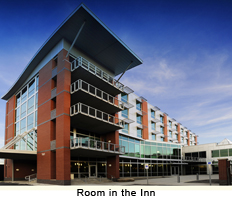 Charles Strobel founded Room in the Inn and its Campus for Human Development in 1986 as a center of learning, respite, shelter, and relief for the homeless. Like the homeless, he can pretty much be found there seven days a week. Originally, it was formed as an organization of local parishes of all denominations that welcomed the homeless in for a meal and to spend the night once the cold set in. The first building they had was traditionally dismal, with some classrooms for AA meetings and art projects, showers, clothing, and a place to pray. Charlie’s primary gift may be his ability to serve the poor, but he possesses the equally necessary gifts of being able to work with a board, the local government, the police, religious organizations of every stripe, and the people who have the money to underwrite his vision. His radical idea was that the homeless need not be served in low, dark places, and that people with nothing should be able to stand beside people with everything and hold up their heads. The building that now comprises the Campus is new and looks it, as stylishly modern in its glass and steel construction as the expensive condominiums that sprawl through Nashville a few short blocks away. The dignity with which Charlie had always treated the homeless was finally reflected in their surroundings. The mission statement of the campus reads, Emphasizing the scriptural ideals of love and community through service to the homeless, our Campus provides faithful people of Nashville an opportunity to respond directly to the broken and the disenfranchised among us. The fellowship with the poor is at the heart of our purpose.
Charles Strobel founded Room in the Inn and its Campus for Human Development in 1986 as a center of learning, respite, shelter, and relief for the homeless. Like the homeless, he can pretty much be found there seven days a week. Originally, it was formed as an organization of local parishes of all denominations that welcomed the homeless in for a meal and to spend the night once the cold set in. The first building they had was traditionally dismal, with some classrooms for AA meetings and art projects, showers, clothing, and a place to pray. Charlie’s primary gift may be his ability to serve the poor, but he possesses the equally necessary gifts of being able to work with a board, the local government, the police, religious organizations of every stripe, and the people who have the money to underwrite his vision. His radical idea was that the homeless need not be served in low, dark places, and that people with nothing should be able to stand beside people with everything and hold up their heads. The building that now comprises the Campus is new and looks it, as stylishly modern in its glass and steel construction as the expensive condominiums that sprawl through Nashville a few short blocks away. The dignity with which Charlie had always treated the homeless was finally reflected in their surroundings. The mission statement of the campus reads, Emphasizing the scriptural ideals of love and community through service to the homeless, our Campus provides faithful people of Nashville an opportunity to respond directly to the broken and the disenfranchised among us. The fellowship with the poor is at the heart of our purpose.
Which basically means that I am the person the Campus is serving. This center is there to give me the chance to experience what has been the enormous joy of Charlie’s life—the opportunity to respond directly to the broken and disenfranchised among us.
“All you have to do,” he tells me, “is give a little bit of understanding to the possibility that life might not have been fair.”
The trouble with good fortune is that people tend to equate it with personal goodness, so that if things are going well for us and less well for others, we think they must have done something to have brought it on themselves. We speak of ourselves as being blessed, but what can that mean except that others are not blessed, and that God has picked out a few of us to love more? It is our responsibility to care for one another, to create fairness in the face of unfairness, and find equality where none may have existed in the past. Despite his own dealings with unfairness, this is what Charlie has accomplished.
His radical idea was that the homeless need not be served in low, dark places, and that people with nothing should be able to stand beside people with everything and hold up their heads. “All you have to do,” he tells me, “is give a little bit of understanding to the possibility that life might not have been fair.”
When Charlie’s father died of a heart attack at the age of forty-six, he left behind four children between the ages of eight years and four months. Afterwards, Charlie’s mother, Mary Catherine Strobel, who had lost her own mother in a house fire when she was an infant and her much-loved father when she was sixteen, took a job working as a clerk for the fire department for $185 a month. There were also two great aunts that she took care of, Mollie, who was eighty-one at the time, and Kate, who was seventy-eight. The way Mary Catherine interpreted her husband’s death and their subsequent hardships was that none of it was God’s fault. God, along with their father, would be right there watching over them.
And while God, in the newfound company of Martin Strobel, watched the children from heaven, Aunt Kate and Aunt Mollie watched them during the day while Mary Catherine worked. “They were the reason it was so easy for me to believe Jesus’s words, ‘I am among you as one who serves,’” he said of his aunts. “And that led me to the next step in logic, to believe that God loves us and provides for all our needs—just as any devoted servant would—because I had experienced it so lovingly from Aunt Mollie and Aunt Kate.”
He told me a story from Luke 17, in which the servant who does everything that is asked of him and then, joyfully, does more, is called a “worthless servant” (or an “unprofitable servant,” or “a servant who deserves no credit,” depending on the translation). It is a state of loving service so deep, so all-encompassing, that the servant loses himself, so that the worthlessness becomes a kind of transcendence. “They were worthless servants,” Charlie said, remembering his aunts, his mother. “They wanted nothing more than to serve us, which means that we were their masters. They did everything they could for us. They never disciplined us. I never remember their asking me to help them around the house.” Charlie asked whether I was following him, because the concept of the achievement to be found in worthlessness can be a murky one. It is not the stuff of Sunday sermons. Certainly, I could think of many instances in which people who had been served were not then inspired to go and serve others, but if being profoundly loved enabled us to love profoundly then, yes, I understood.
“Wouldn’t that be a wonderful thing to have on your tombstone?” he said to me. “Worthless Servant?”
I told him I wasn’t there yet, but that I could see it as something to aspire to.
It is a state of loving service so deep, so all-encompassing, that the servant loses himself, so that the worthlessness becomes a kind of transcendence.
“I hesitate to say this,” he said, and then he gave such a long pause that I wondered if he did in fact plan to proceed, “so many people have struggles with their faith, but God has never been a struggle for me. I’ve been a struggle for me, but I could never honestly believe in the nonexistence of God.”
It was the only thing he hesitated to tell me for the entire day. He felt it might be cavalier to admit that something that was so difficult for so many had come to him, and stayed with him, without effort.
In the main lobby of the Room in the Inn there is a sculpture of a tree on the wall with more than 650 leaves. Every leaf bears the name of a homeless man or woman who has died in Nashville, and the presence of God did not waver any time a new leaf was added. It did not waver in December of 1986, when Charlie’s mother, Mary Catherine Strobel, then seventy-four, was kidnapped from the parking lot of Sears in Nashville and murdered by an escaped convict from Michigan, the first victim in a spree that ultimately took six lives.
But the way the story was remembered over the years was that she had been working at the Room in the Inn at the time, and that she was killed by a homeless man. People said that Mary Catherine had started the Room in the Inn, and that Charlie took up her work as a penance. By making her murder a consequence of her own associations, people could safely distance themselves from such a random act of violence. Charlie was often asked if he would continue his work after his mother’s death. “If it was worth doing before,” he said, “why wouldn’t it be worth doing now?”
“Many have said that she did not deserve to die the way that she did,” her son said at the funeral mass. “Yet for years, we have heard it said that ‘God did not spare his only Son but delivered him up, and the Son emptied himself and humbled himself, obediently accepting even death, death on a cross.’ In Mama’s death, our family believes that the viciousness inflicted on such gentleness and kindness, as was her way, brings about a great communion with Jesus. So, how can we question its course? It seems to run true to the form of Jesus’s own death. And why speak of anger and revenge? Those words are not compatible with the very thought of our mother.”
“Of course her death changed all of us,” he told me that afternoon after we had left Ron and Sid, while we were on our way to visit a formerly homeless woman in the hospital who was struggling to care for her grandchildren as her health declined sharply. “But maybe not the way people thought it did. Our mother’s death helped me focus on what was important. After that I became more single-minded about what I should be doing with my life.”
There is throughout the course of life a long line of fathers and sons, parents and children, servants and masters, forgiven and forgivers, and at different moments we are called on to take up one role and then the other. When we do it right, we are bearing the example of Christ in mind. When we finally made it back to the Room in the Inn, it was past 8:00 in the evening and still light out, the longest day of the year. The achievement of Charlie’s life surrounded us, not the dazzling building or the flowers stretching out in front of the property, but the crowd of people spreading out in every direction. This was the place they had come to feel safe, to feel loved. These are the people he serves.
Copyright © 2013 by Ann Patchett. All rights reserved. This article originally appeared in Not Less Than Everything: Catholic Writers on Heroes of Conscience, From Joan of Arc to Oscar Romero, edited by Catherine Wolff.
